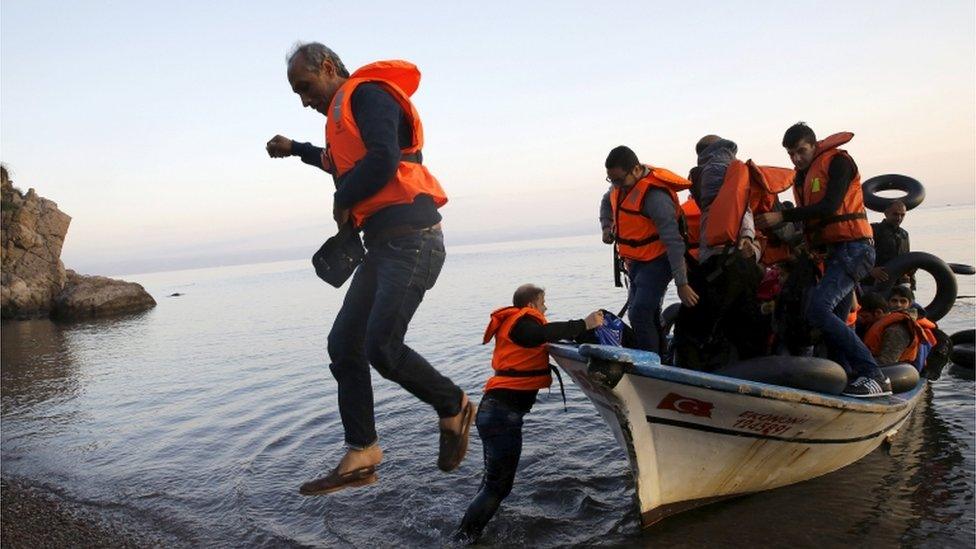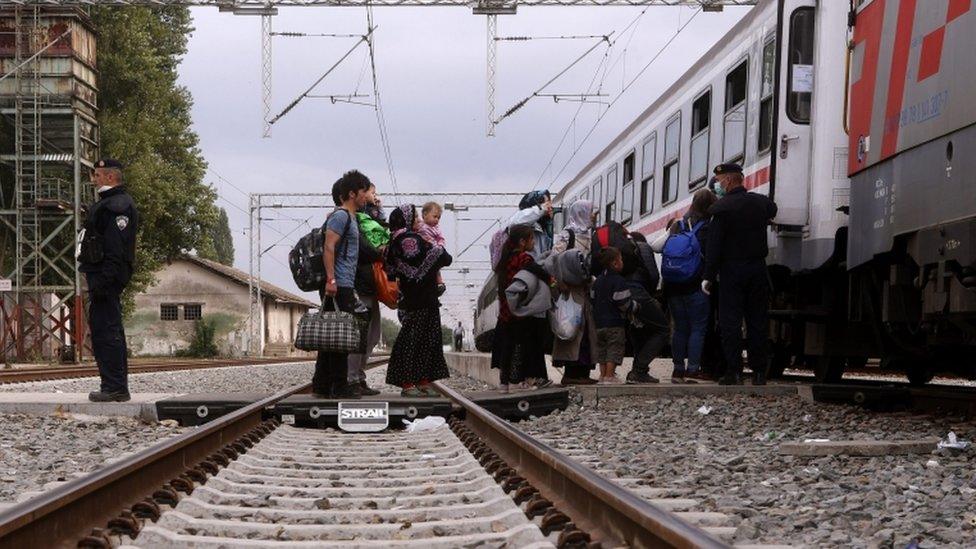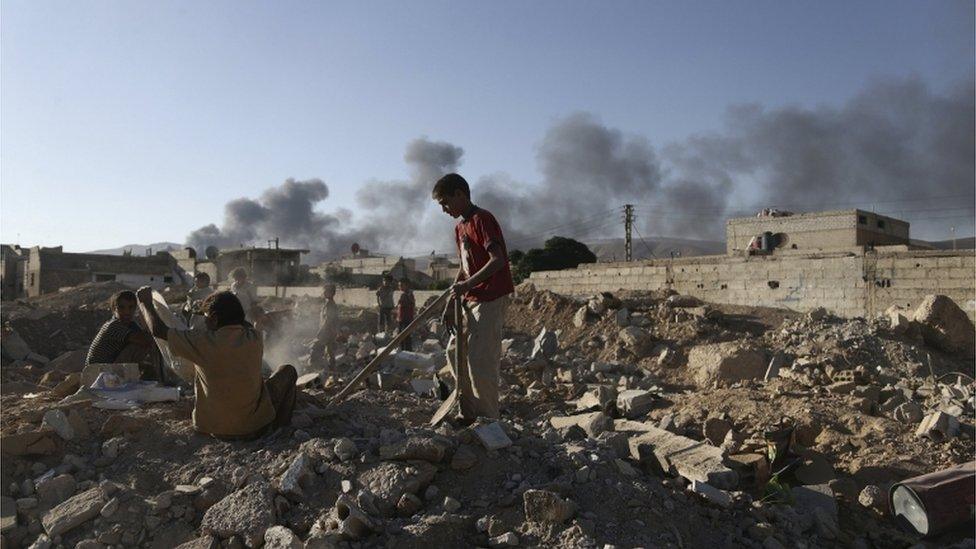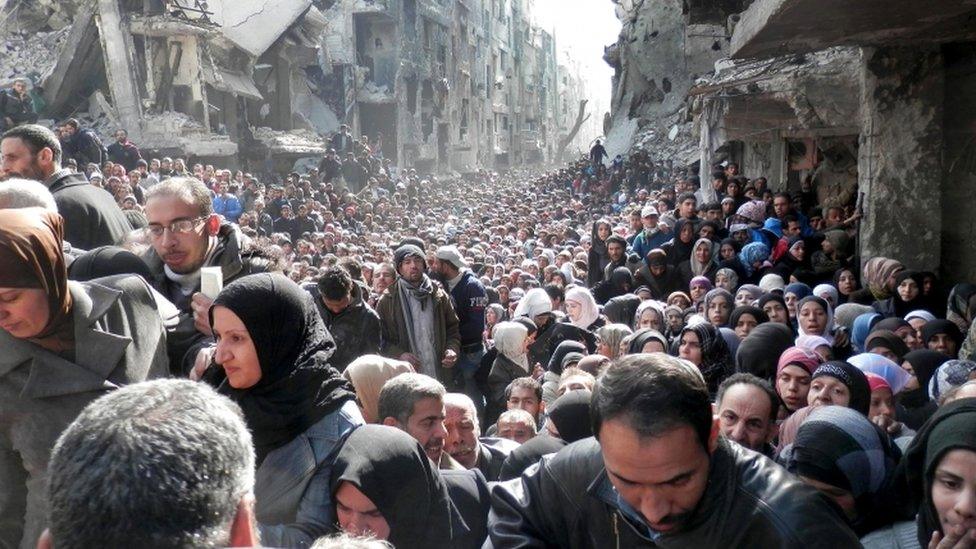Migrant crisis: Middle classes on the move
- Published

Thousand of Syrians are still risking their lives to cross the Mediterranean
It is still startling to see the human river now coursing across Europe, streaming through fields, surging over borders or halting at formidable metal barriers.
It is still shocking to see thousands of exhausted travellers sleeping rough, on roadsides or railway tracks, or spread across grassy verges, as they wait for buses or trains to take them further on their journey.
And it raises searching questions: what kind of lives have they fled? What future awaits them somewhere in Europe, if not beyond?
"It's a tragedy to see people moving from border to border, never knowing which border will be open tomorrow," says Antonio Guterres, head of the UN's refugee agency, when we meet in the margins of the UN General Assembly in New York.
"Five thousand people are arriving every day," he says, with palpable frustration over Europe's failure to move on longstanding pledges to establish proper reception and screening centres in Greece and Italy, at the first points where people arrive.
Last week, at a summit in Brussels, there was a promise to set up "hotspots" by the end of November.
For now, "Where are you from?" is the simple question posed by the legions of journalists, aid officials and volunteers who congregate along border crossings.
"Syria" still seems to be the most frequent reply. That's what people tell us, that's what UN officials report.
The UNHCR's latest figures on Mediterranean Sea Crossings, external this year, which add up to just short of 500,000 by late September, put Syrians at 54%. Afghans fall in second place at 13% arriving.
When you look at Greece alone, the figure for Syrians rises to 71%.

Mediterranean Sea Crossings:
499,826 arrivals by sea in 2015
2,980 Dead/missing in 2015
Of the total, 54% are from Syria, 13% Afghanistan, 7% Eritrea, 3% Iraq, 3% Nigeria, 3% Pakistan, 2% Somalia, 2% Sudan
69% are men, 18% children and 13% women
Source: UNHCR

Months into this massive pilgrimage of our time, the face of this flow keeps changing. And the stories people bring are different too.
All told, Syrians tell a story of a country, devastated by four years of punishing war, that is now being depopulated of its educated middle class.

Migrants attempt to reach the eurozone via the border town of Tovarnik in Croatia
At the railway station in the Croatian border town of Tovarnik, I recently met a microcosm of Syria's young professionals huddled together in the baking heat: an electrical engineer from Latakia on the coast, possibly the safest area under government control; a banker from war-torn Aleppo who said he's pursuing his "destiny;" a young businessman who paid thousands of euros for a 20-minute ride in a speedboat to get to Greece.
They had all left Syria only days before.
They had made a decision to flee a destructive war without end and to pursue the possibility of a future their own country now seems to deny them.
"Many people are saying if we're going to go, we must go now while Europe's door is open," a Western aid official living in Damascus tells me as he lists the people he knows personally that are leaving, week after week.
UN reports say an estimated 5,000-7,000 Syrians now arrive in Lebanon every week from Syria en route to a Mediterranean crossing.
A little more than half that number are said to come from Damascus.
Living hell
In recent weeks, I kept meeting Syrians who said they had come from Mezzeh, a relatively wealthy neighbourhood in central Damascus which is home to embassies and some popular cafes.
No area of Syria is now untouched by war, but some are ravaged, others much less so.

Ghouta is among the embattled areas around Damascus
Others speak of an escape from places in and around Damascus where life is a living hell - besieged and embattled areas like Qudsaya, Yarmouk, Ghouta.
In northern Greece, on the edge of the no-man's land leading to the former Yugoslav republic of Macedonia, I see another snapshot of Syria today.
An old man, his weary eyes drained of light by a dark war, wore his sadness like a suit.
He tells me he is from the Palestinian camp of Yarmouk, on the southern edge of the capital, which lies in utter ruin.
He pulls his crumpled UN refugee card from his pocket to confirm his identity. It seems to be all he has.
"I will bring my wife and children later," he explains. "There's so little water and food, but I couldn't afford to bring them now."
Next to him, a tall, well-dressed man surrounded by his large extended family tells me he is from Idlib in the north.
When I ask what life is like now after a coalition of Islamist forces took power, he replies vaguely.
Then, when I hear him speaking fluent Greek to local police, he admits he left Syria four years ago to live in Cyprus.
When his family's turn comes to cross the border, he bends to lift a tall, disabled teenage girl to carry her on his back.
A second disabled girl stumbles along behind holding her mother's hand.
Everyone, whatever their circumstances, has a reason to seek what they hope will be better life in Europe.
Life's hard limits
"Everyone's life is affected by the violence," a local UN official tells me when I ask about concern that wealthier Syrians will find their way to the front of the queue at the expense of the truly destitute, displaced in whatever shelter they manage to find, across Syria or in refugee camps in neighbouring nations.
"We take some of the most vulnerable who don't have the wherewithal to get to Europe." Ann Richard, the US Assistant Secretary of State for Population, Migration, and Refugees explains in an interview in New York.
"The people who are streaming across Europe are largely middle class educated people seeking more opportunities for themselves, and for their children."
But they're also fleeing a devastating war that's taking a terrifying human toll.
And it's not just Syrians who want to escape life's hard limits in harsh lands.
On the railway lines in northern Greece, I met three generations of a large family of Afghans from the northern city of Mazar-i-Sharif.

Conditions are harsh at the ruined Yarmouk camp
The youngest child shyly clutched her father's hand. Two young brothers struggled to carry their ailing grandmother in her wheelchair across the pebbly stretches of track.
"Isn't Mazar-i-Sharif one of the safest areas of Afghanistan?" I ask.
Their reply is the same refrain I heard from almost every Afghan I met on this perilous journey across Europe.
There's worry about a growing presence of so-called Islamic State and mounting attacks by Taliban fighters.
This week's startling Taliban advance on the provincial capital Kunduz in the northeast will only swell what is already a steady stream fleeing the area,
This massive displacement is both a journey to safety and a huge jobs fair.
"Where are you from?" I ask a tall African man who stands out in a crowd.
"Somalia," he replies, and then averts his gaze, saying: "Please don't film me."
Minutes later, a man standing behind him breaks away to admit that their group of 20 young men had travelled from Ghana, regarded as one of the most stable countries in West Africa.
"I was about to be arrested for a recent fire in a market which wasn't my fault," he explains. "I had to leave."
Everyone has a reason to leave. Everyone believes they have good reason to be given a chance at a better life - no matter where they come from.
"This uncontrolled movement creates opportunities for people who are not refugees to try to have their chance," admits the UNHCR's Guterres.
"Europe has to realise it will take a massive capacity to assist people when they arrive, to grant them their dignity, to verify their stories, to ensure that when people say they come from Syria, they haven't come from somewhere else."